#as i see it a ceasefire is the only morally acceptable position to take in addition to benefitting Literally Everyone
Text
Israel/Gaza
I have not personally commented in public on the Israel/Gaza conflict until now (USV signed on to a statement). The suffering has been heartbreaking and the conflict is far from over. Beyond the carnage on the ground, the dialog online and in the street has been dominated by shouting. That makes it hard to want to speak up individually.
My own hesitation was driven by unacknowledged emotions: Guilt that I had not spoken out about the suffering of ordinary Palestinians in the past, despite having visited the West Bank. Fear that support for one side or the other would be construed as agreeing with all its past and current policies. And finally, shame that my thoughts on the matter appeared to me as muddled, inconsistent and possibly deeply wrong. I am grateful to everyone who engaged with me in personal conversations and critiqued some of what I was writing to wrestle down my thoughts over the last few weeks, especially my Jewish and Muslim friends, for whom this required additional emotional labor in an already difficult time.
Why speak out at all? Because the position I have arrived at represents a path that will be unpopular with some on both sides of this conflict. If people with views like mine don’t speak, then the dialog will be dominated by those with extremely one-sided views contributing to further polarization. So this is my attempt to help grow the space for discussion. If you don’t care about my opinion on this conflict, you don’t have to read it.
The following represents my current thinking on a possible path forward. As always that means it is subject to change despite being intentionally strongly worded.
Hamas is a terrorist organization. I am basing this assessment not only on the most recent attack against Israel but also on its history of violent suppression of Palestinian opposition. Hamas must be dismantled.
Israel’s current military operation has already resulted in excessive civilian casualties and must be replaced with a strategy that minimizes further Palestinian civilian casualties, even if that entails increased risk to Israeli troops (there is at least one proposal for how to do this being floated now). If there were a ceasefire-based approach to dismantling Hamas that would be even better and we should all figure out how that might work.
Immediate massive humanitarian relief is needed in southern Gaza. This must be explicitly temporary. The permanent displacement of Palestinians is not acceptable.
Israel must commit to clear territorial lines for both Gaza and the Westbank and stop its expansionist approach to the latter. This will require relocating some settlements to establish sensible borders. Governments need clear borders to operate with credibility, which applies also to any Palestinian government (and yes I would love to see humanity eventually transcend the concept of borders but that will take a lot of time).
A Marshall Plan-level commitment to a full reconstruction of Gaza must be made now. All nations should be called upon to join this effort. Reconstruction and constitution of a government should be supervised by a coalition that must include moderate Islamic countries. If none can be convinced to join such an effort, that would be good to know now for anyone genuinely wanting to achieve durable peace in the region.
I believe that an approach along these lines could end the current conflict and create the preconditions for lasting peace. Importantly it does not preclude democratically elected governments from eventually choosing to merge into a single state.
All of this may sound overly ambitious and unachievable. It certainly will be if we don’t try and instead choose more muddling through. It will require strong leadership and moral clarity here in the US. That is a tall order on which we have a long way to go. But here are two important starting points.
We must not tolerate antisemitism. As a German from Nürnberg I know all too well the dark places to which antisemitism has led time and time again. The threat of extinction for Jews is not hypothetical but historical. And it breaks my heart that my Jewish friends are removing mezuzahs from their doors. There is one important confusion we should get past if we genuinely want to make progress in the region. Israel is a democracy and deserves to be treated as such. Criticizing Israeli government policies isn’t antisemitic, just like criticizing the Biden administration isn’t anti-Christian, or criticizing the Modi government isn’t anti-Hindu. And yes, I believe that many of Israel’s historic policies towards Gaza and the Westbank were both cruel and ineffective. Some will argue that Israel is an ethnocracy and/or a colonizer. One can discuss potential implications of this for policy. But if what people really mean is that Israel should cease to exist then they should come out and say that and own it. I strongly disagree.
We must not tolerate islamophobia. We also have to protect citizens who want to practice Islam. We must not treat them as potential terrorists or as terrorist supporters on the basis of their religion. How can we ask people to call out Hamas as a terrorist organization when we readily accept mass casualties among Muslims (not just in the region but also in other places, such as the Iraq war) while also not pushing back on people depicting Islam as an inherently hateful religion? And for those loudly claiming the second amendment, how about also supporting the first, including for Muslims? I have heard from several Muslim friends that they frequently feel treated as subhuman. And that too breaks my heart.
This post will likely upset some people on both sides of the conflict. There is nothing of substance that can be said that will make everyone happy. I am sure I am wrong about some things and there may be better approaches. If you have read something that you found particularly insightful, please point me to it. I am always open to learning and plan to engage with anyone who wants to have a good faith conversation aimed at achieving peace in the region.
8 notes
·
View notes
Link
Pairing: MadaraTobirama
Chapter: 12/18
Word count: 2307
Summary: When Tobirama is exiled from the Senju clan without warning, without even the chance to plead his case, it feels like his life is over. What does he have to live for now without his older brother to believe in him? Captured by the Uchiha in his moment of weakness, Tobirama slowly learns to live again with the last people on earth he would have ever expected to care for - or to fall in love with.
Follow the link or read it under the cut!
KO-FI and commission info in the blog header!
Chapter 12
Waking up with Madara wasn’t half as embarrassing as when Izuna found them and threw himself across their legs like an asshole, snickering and yelling something about a family group hug. Madara and Tobirama made a team effort to beat him back off the mattress, at which point Madara hauled himself up as well to chase his brother around the house while Tobirama flopped back down on his bed to catch the lingering warmth of their embrace.
He was going to have to figure out what the hell was going on with his emotions sooner or later but, like in all things of this category, he was set firmly on the ‘later’ option. Emotions had never been the easiest thing for him to delve in to but now it felt as though each step forward he made towards healing was accompanied with his slowly recovering heart pulling away and cowering under the covers, afraid of making progress when he knew damn well it would only leave him vulnerable again. It was, he had discovered, incredibly frustrating to be so divided within himself. His mind may have finally accepted the idea of moving on, his head trusted the Uchiha – Madara and Izuna specifically – but his heart was wary, terrified of going through the same hurt all over again.
Fool him once and apparently he started looking for fools around every corner.
Breakfast that morning was mostly filled with bickering to start, the two brothers snipping back and forth at one another in full-on sibling mode, tossing salt in to each other’s bowls, kicking each other’s legs under the table. They stopped only when Izuna accidentally kicked Tobirama’s knee instead and earned them both a level stare that jerked both of their spines upright. Tobirama went back to eating his porridge with a deceptive air of calm that they knew very well could snap at a moment’s notice if they disturbed him like that again. Not wanting to risk his temper before at least one full cup of tea, they did the same.
It was after they all finished eating and the dishes had been piled lazily in the sink that Tobirama was delivered the latest shocking news in his ever changing life. He could tell something was up by the way Madara kept peeking at him from the corner of one eye but he let it rest until the man cleared his throat and opened the subject on his own, inviting Tobirama in to his study with an apprehension that spoke of uncertainty. Whatever the news was he didn’t look overly positive that Tobirama would like it. Thoughts already struggling not to slide down that familiar dark slope, Tobirama followed him with a tight chest.
He was surprised to see Madara place a single scroll on his uncharacteristically clean desk as soon as they both sat down in his office. When he reached for it, however, Madara kept his hand over it and chewed on his bottom lip, eyes darting from side to side with obvious anxiety, nervous for some reason about what he had to say.
“I was angry that things had to be so difficult for you,” came the first attempt at explanation. “Nothing more than this has been decided. We’ve written a few more times than this but I’m being vague until you can help decide where to go forward from here.” Then he nodded decisively and pushed the scroll forward.
Even more curious now, Tobirama gently unrolled it and let his eyes skim through the contents quickly. When he was done he went back and read it through again, then very carefully set it down lest his shaking fingers drop it unintentionally.
“Peace,” he whispered.
“A ceasefire,” Madara corrected him hurriedly. “At the moment, anyway. It’s not an alliance right now. It won’t be anything you don’t want it to be.”
“You did this for me?” he couldn’t seem to lift his eyes away from the scroll, the words hidden from him now that they were rolled up again yet imprinted on his memory in such a way he knew he would never forget them. He could easily recognize both the original hand that had penned the letter and the hand that had scribbled a heartfelt, tear-stained response down below, though it was taking a few moments for the reality of what he had read to settle it. It was hard to believe.
Madara huffed as though with great offense. “I have more important things to think about than just you.”
From the way he didn’t quite let their eyes meet Tobirama deduced that statement was only half true but he stuck a mental pin in that train of thought to save it for another time. Right now he already had something mind-bending to focus on. Like the fact that the hostilities between the two infamous rival clans might finally be seeing an end of sorts after countless generations and it was all because Madara had seen how hard the current situation was for him.
Lives saved. Children allowed to grow. Families kept together without being torn apart by untimely and gruesome deaths. All because Madara had seen his struggle and found a way to make things easier for him.
“You said that the two of you had communicated further?” he ventured. Almost immediately there was a handful of other scrolls on the desk.
“He’s proposed half a dozen other things of course but I’ve been keeping my answers vague without committing to anything just yet. I didn’t know what all you would approve of and I thought perhaps you might have a few insights to share besides. You would know his thought patterns better than I would. What’s the point of having insider information if I don’t use it, right?”
“Right.”
“Not that–! I didn’t meant to say–!”
“Hush.” Tobirama rolled his eyes with a small smile. “I understood what you meant.” After all the things this man had done for him there wasn’t a single part of him left that could believe Madara had been grooming him as a convert of some sort. Though it had taken a great deal of time, he had finally come to accept that he meant more to the people here than a sink of information on their oldest enemy. Just as he had been thinking earlier, he trusted this man, knew him better than to believe such things.
It was amusing to watch Madara deflate with such heavy relief. “Oh. Good then. Well, if you wanted to read through these you are very welcome to. He’s covered pretty much every option from a more formal peace treaty all the way up to building that ridiculous village he and I used to talk about.”
“The village. He never…he never did stop talking about the village.” Tobirama reached out to run his fingers over the rolls of parchment, wondering which one of them contained those familiar dreams he had heard about so often, indulging or ignoring them as his mood dictated. After all the times he’d listened to it he could probably recite the speech by heart.
“Really? Huh. I knew he kept asking but I just thought he was stubborn.”
“Bull-headed, I would say.”
Madara snorted. “Now that’s a word I think would apply more to you.” Tobirama resisted sticking out his tongue but it was a close thing.
“This village, though. Wasn’t that your dream too?”
Oddly enough, Madara shifted uncomfortably and looked away before answering.
“I dreamed about that a long time ago,” he agreed, avoiding the real question.
“Yes,” Tobirama pressed, “but do you still?”
“Maybe? I don’t know, to be honest. The idea was to create a place where I could protect the last of my little brothers but I feel like I’m strong enough to do that myself now. Doubly so with your strength added between us. What do I need a village for now?”
“To protect everyone else’s little brothers,” Tobirama suggested quietly.
He shrugged when Madara gave him a long look. He could practically hear Hashirama’s voice in his head and it was messing with his own morality system in a strange way, making him think about things he normally wouldn’t consider. Actually it was sort of annoying. If this was what it was like to have more of a conscience then he didn’t like it very much; it just felt like guilt before he’d even done anything and he sort of resented that. The village had never been something he believed in. Normally his reaction whenever Hashirama started going off about it was to roll his eyes and repeat that the chances of both clans agreeing to peace was so slim they were better of discarding the whole idea to never bore him with it again.
Sitting here with Madara now, staring across the desk at the roll of parchment sitting innocently as though it contained anything less than the beginning of momentous events, he wondered if he might have been wrong all this time. Could there have been a way to convince Madara if he had never come here? It was a pointless tangent to think about because he had come here and they would never know how things could have been otherwise but it gave him more to think about. All the arguments Hashirama had made in favor of peace over the years came rushing back for him to turn them over and over again, giving them proper consideration for perhaps the first time.
Both of them were quiet for a while, meeting each other’s eyes and looking away to disappear back in to their own thoughts. In the silence between them Izuna could be heard puttering around somewhere else and singing to himself in a terribly off-key voice, cutting through the tension even without realizing he was doing so. Finally it was Madara who spoke up again.
“We won’t agree to anything that would make you more uncomfortable,” he said. Tobirama twisted his mouth to one side with indecision.
“But you cannot consider my comfort above what is best for the entire clan. Don’t the children deserve somewhere safe to grow up? Not everyone has a brother as strong as you, after all.” He watched Madara shift between preening over the compliment and frowning over the reality of the situation.
“If we build a village with the Senju”–his voice stayed low, soothing, the sort of voice one might use to keep a wild animal calm–“you would have to see him again. And all of them.”
Tobirama sighed. “Not necessarily. He’ll hardly expect to get to know every single member of the clan and his chakra is fairly hard to miss; he’s rather easy to avoid and even easier if I have an entire village to maneuver around him. Without me the Senju are weakened by their lack of natural sensors. If I put in a little effort I’m sure I could disappear in to the ranks and never interact with any of them if I so desired. All I’d have to do is stay within the boundaries of my own people.” With a cock of the head he set his eyes upwards to look out the window and give himself a moment to think. It was such a clear morning, the sort of morning he had often taken advantage of to serve breakfast on the back porch so Hashirama could point out what birds were nesting in the bushes of their garden.
As much as the man had hurt him, Tobirama couldn’t bring himself to believe that Hashirama had ever had a single bad intention. Their beliefs and their morals had never matched exactly but each of them had always done what they believed was best for their clan. It hurt, of course it did, to know that Hashirama considered it best to have him gone but one upset between the two of them could not convince him to wish any ill on the other. Hashirama deserved to have those mornings with whoever he chose to keep by his side.
Just as Tobirama himself deserved the same. Watching a flock of birds wheel and turn, he tried to imagine what a village like that would look like, how peaceful it would be to serve breakfast on the back porch with Madara and know that no one could ever take what was precious to him again.
“Write him back,” he murmured. “And tell him he can have his village. Tell him to invite any clan he sees fit and that we will do the same. My past should not inhibit other people’s futures.”
“If you are absolutely sure…”
“Yes, I am.” Tobirama nodded, breathing deep. He wasn’t sure the pain of what happened would ever go away but it was lessening, softening, and he had only the man before him to thank for that. Madara eyed him for a few moments to be sure he wasn’t hiding his feelings or anything and then he nodded too.
“Alright. Well. Get out of here, then. I’ve got a lot to do today and all of it is math. Ugh.” One hand gestured to the other scrolls all pushes off to the far side of his desk where he always left the clan accounts as the last task to complete.
Not even bothering to hide his amusement, Tobirama gratefully allowed the emotional moment to slide away in favor of lifting one eyebrow and pointing out, “You’re good at math.”
“That doesn’t mean I like it.”
“I suppose. Perhaps if you asked very nicely I might be enticed to help you.”
A scroll filled with monthly accounts hit him in the chest a moment later but it wasn’t followed by any insults and Tobirama figured that was about as nice as he could expect Madara to be.
27 notes
·
View notes
Text
Death by lion for not punching a prophet (1 Kings 20:35-36)
Note: This card was previously discussed by one of our guest bloggers. We wanted to nerd out about this card and do a deep dive from another perspective. This will include addressing why Card Talks like this one result in us having to read hate mail. Regardless, no prophets were killed in the making of this Card Talk (as far as you know).
Punch or Die
At the command of the Lord a certain member of a company of prophets said to another, “Strike me!” But the man refused to strike him. Then he said to him, “Because you have not obeyed the voice of the Lord, as soon as you have left me, a lion will kill you.” And when he had left him, a lion met him and killed him. (1 Kings 20:35-36)
This is all seems pretty straightforward. Prophet 1 (P1) tells prophet 2 (P2) to hit him. P2 says no and promptly gets attacked by a lion. However, the story continues.
P1 finds another prophet (P3) and makes the same request. P3, possibly knowing what happened to P2, acquiesced and beat the crap out of P1. But this is where things get interesting. Prophet 1 covered some of his wounds with bandages, and disguised himself as a solider coming back from the war that was raging in the area. He then waited for Ahab, the king of Israel, to come along the road. When king Ahab arrived, the prophet told him a story:
In the midst of the battle, an officer told him to guard a prisoner. If the prisoner escaped “the solider” would either be killed, or forced to pay a fine of a talent of silver, which is over 100 times the average cost of slave (c.f. Exodus 21:32). In other words, the fine was tantamount to a death sentence. As with all battles, crap happens and the prisoner escaped. “The solider” asks the king what he should do. King Ahab has no pity on “the solider” and says, “So shall your judgment be; you yourself have decided it” (vs 40) (i.e. “you’re screwed”). At this point, “the solider” drops his disguise and Ahab, recognizing him as a prophet, knows he’s in deep trouble. The prophet condemns king Ahab, saying, “Thus says the Lord, ‘Because you have let the man go whom I had devoted to destruction, therefore your life shall be for his life, and your people for his people’” (vs 42). King Ahab then returned home thoroughly shaken, waiting for the judgment of God to fall.
The end.
Okay, but none of that explains the deal with P2 and the lion attack. But yes, it really does. Ultimately, this is a story about two people “getting what they deserve” for not listening to the voice of God.
King Ahab Gets What He Deserves
A little background might help. Chapter 20 of 1 Kings tells the story of king Ben-Haddad of Aram waging war against the northern kingdom of Israel.
In (brief) summary:
(vs 1-6) Ben-Haddad gathers a huge army, besieges Samaria (the capital of Israel), and tells Ahab “your silver and gold are mine; your fairest wives and children also are mine.” To which Ahab responds, “cool.”
(vs 7-12) The elders/nobles of Israel, not okay with this arrangement, tell Ahab to grow a backbone. So he does, telling Ben-Haddad he politely declines. Ben-Hadad’s reply can be translated to mean either, “I swear by god, my army is so vast, that there will not be enough ground to stand on when we come to level this city!” OR “I swear by god, my army is so vast, that when we finish leveling this city, there will not be enough dust left to fill the hands of my men if they wanted to take home souvenirs!” (#TrashTalking). Ahab swings back with, “one who puts on armor should not brag like one who takes it off” (vs 11). In other words, “run your mouth after you win!” So Ben-Haddad, who is drunk when he gets this message, screams for his men to get into fighting position.
(vs 13-22) A prophet of God gives Ahab a battle strategy involving a lightly armored, special-forces unit. They attack in the middle of the day and catch Ben-Haddad off-guard because he’s still drunk. God leads the Israelites to victory, routing the superior force and their heavy weapons, and lifting the siege. They pursue Ben-Haddad, but he is able to escape. Though victorious, through the prophet, God warns of the another attack.
(vs 23-27) Sure enough, Ben-Haddad has a new battle plan: fight at a new location with more troops.
(vs 28-34) But God is ready for the forces of Aram and says, “wipe them out.” And they do. Mostly. Ben-Haddad gets away again and goes into hiding. His servants convince him to attempt to make a peace treaty. They contact Ahab for parley and make terms for a ceasefire. Ahab accepts. And that’s the problem.
God felt that Ben-Haddad was an evil to be eradicated, not an ally to make a treaty with.
This brings us back to the confrontation and the prophet’s words to king Ahab:
“Thus says the Lord, ‘Because you have let the man go whom I had devoted to destruction, therefore your life shall be for his life, and your people for his people.’” (vs 42)
Ahab went against God’s long-standing commandments about not working with his oppressors, and he is getting what he deserves.
And while we could spend time arguing about what to do with the Bible’s use of God-directed violence in this text (as we do with some others), the lesson of this passage is wrapped up in the biblical assertion that you do what God tells you to do: if God says, “kill them all,” you kill them all. It’s a lesson Ahab should have already learned from history. Ask King Saul: he pissed off God doing pretty much the exact same thing (1 Samuel 15).
What’s more, the prophet gave Ahab a scenario which exposed him as a hypocrite: he was condemning a man while not living up to the same standard. This is exactly what Nathan did to David in regards to his treatment of Bathsheba and Uriah. And is is also the same standard that Jesus holds us to, and says we should hold others to (regardless of how horribly He is misquoted).
And while all of this is well and good, you’re probably (still) asking, “but WTF does this have to do with the death by lion part?!”
Glad you asked. But first, you should know that the lion probably didn’t kill him.
Just messed him up a bit. Maybe a whole lot.
The Prophet (P2) Getting What He Deserved
Let’s start with the job of a prophet: one who presents the word/vision of God to the people. The prophet bears the weight of divine command and responsibility. So when one prophet gives another prophet a divine command, that second prophet knows the authority under which the first prophet is operating. Denying the words of the prophet is denying God.
(Read that again.)
In this story, P2 refused to heed the call of God. Just like Ahab refused his instructions. But, as with most things biblical, things get more interesting (and complicated) when we dive into the diction and definitions of the words employed.
Below we’ve parsed the Hebrew in the passage; notice the highlighted words. Hebrew readers: you’ll see where we are going pretty quickly. Non-Hebrew readers: be patient, we’ll explain.
At the command of the Lord a certain member of a company of prophets said to another, “Strike {נָכָה nakah - hiphil imperative} me!” But the man refused to strike {נָכָה nakah - hiphil infinitive} him.
Then he said to him, “Because you have not obeyed the voice of the Lord, as soon as you have left me, a lion will kill {נָכָה nakah - hiphil perfect} you.”
And when he had left him, a lion met him and killed {נָכָה nakah - hiphil imperfect} him.
Then he found another man and said, “Strike {נָכָה nakah - hiphil imperative} me!”
So the man hit {נָכָה nakah - hiphil imperfect} him, striking {נָכָה nakah - hiphil infinitive} and wounding him.
~ 1 Kings 20:35-37
In case you missed it, “strike,” “striking,””hit,” and “kill”are all the same word in this passage {נָכָה nakah}, but with different parsing of the verb (Non-Hebrew readers: think of all that “hiphil,” “imperative,” “infinitive” stuff as different ways to conjugate the verb).
The Hebrew word nakah means to “hit” or “strike,” but the hiphil imperative in vs 35 and 37 is referring to a very serious blow/attack. This could also be rendered, “beat the ever-living crap out of me!” Which makes sense: the prophet’s disguise only works if he looked like he got wreaked on the battlefield. So props to the prophet for being willing to take a beating for his mission.
This is a form of the prophetic “sign-act”— a physical parable, the action of the prophet is symbolic of a deeper truth. They are common in the Bible and include Jeremiah breaking pottery in front of religious leaders (Jeremiah 19:1–13), walking around wearing a yoke for oxen (Jeremiah 27–28), and offering wine to prohibitionists (Jeremiah 35:1–19), Isaiah walking around naked for three years (Isaiah 20:2), and Ezekiel cooking food over human excrement (Ezekiel 4:9-15).
However, this unnamed prophet was performing a “sign-act” with higher stakes. He will bear the marks of his commitment to God’s message in his very flesh. And maybe that’s part of the point: if he could take the beating, why can’t the other prophet give it? But don’t be too worried about the second prophet: like we said, chances are that he wasn’t killed by that lion.
Notice that in verse 36, the Hebrew for “slew him” is nakah again, however, this time it is the Hiphil perfect. Meaning, we was probably just mauled by the lion, not killed. Which, while not great, is certainly better. But also consider the balance of the image presented by a mauling: because he didn’t do God’s will, he was made to suffer the same injuries as the other prophet. He shared in the first prophet’s pain.
You Don’t Have to Like it to Understand the Message (or Keep your misinformed hate mail to yourself)
The Bible is an ancient text filled with stories that, on first (or second, or third) pass can seem very nasty, brutish, and short. But there is generally an underlying morality that makes perfect sense in an Ancient Near East context. Read that last part again: it fits into the ANE context.
Every once in a while we get hate mail, not because we said something blasphemous and some SOLIDER OF THE LORD has to point out our evil ways, but because someone who was burned by Christianity (or a Christian, or a “christian”) wants to rant about how the passage we’ve explained is proof positive that the God they don’t believe in is evil and not worthy of worship. Generally it’s because of Card Talks like this one, where we explain something that does not fit into our modern sensibilities. So we’ll say it again:
The Bible is an ancient text filled with stories that, on first (or second, or third) pass can seem very nasty, brutish, and short. But there is generally an underlying morality that makes perfect sense in an Ancient Near East context.
However, while this is true, there are often still lesson that can be applied to our lives today (otherwise, what the Hell are all those clergy people doing every week…other than ignoring passages like this one?).
Perhaps we should think about our own hypocrisy: the times we hold others to a standard we do not uphold ourselves.
Perhaps we should think about the ways we do not live up to the calling on our lives, not doing the things what we know we’ve been told to do. Perhaps the resulting consequences, the punishments, actually do fit the crime.
Perhaps we should think about what we are willing to do, the sacrifices we are willing to make, in order to bring the Word of God, a vision of God, to others, remembering that word, that vision, can be a blessing, a hug, a kind word, a song, an encouragement, or countless other positive, life-affirming realities we often makes excuses instead of bringing into the lives of others.
But what do we know: we made this game and you probably think we’re going to Hell.
1 note
·
View note
Text
Human Debris Masterpost (6/12)
So, before we start, yes, I’m as surprised as anyone that Chad made it out of this week’s episode alive. You guys, I don’t know what I’m going to do with myself if Akihiro, Chad and Dante all manage to survive this. Could I possibly get so lucky?
Ride, meanwhile, seems destined to coast gracefully out the end of the show on a tide of corpses. I’m like 80% sure that kid’s parents were the first victims of whatever fell powers they bargained with to avert any doom that ever came for their son.
In any case, this will not be a hugely long post, as there’s not a lot of red-stripe activity in the finale, so lets get on to it, with...
EPISODE TWENTY ONE — To the Place of No Return
Wildly little to talk about with this one. Akihiro is our only Human Debris character in the whole thing, so just to hit the highlights:
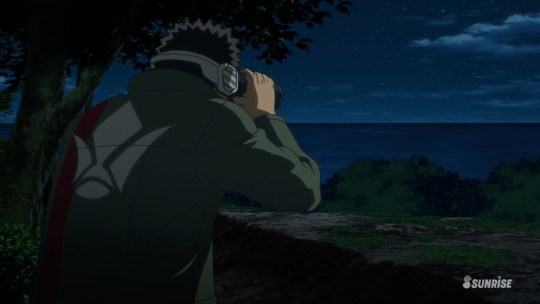
He’s briefly shown in a lookout position with Mikazuki as Gjallarhorn draws closer.
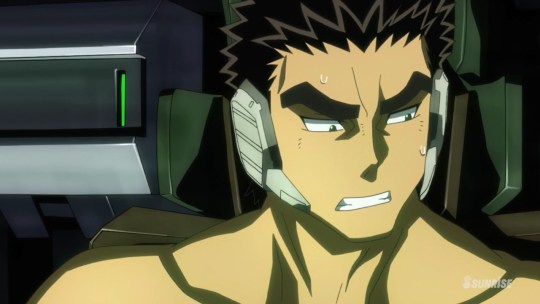
He’s also having some trouble adjusting to in-atmosphere combat in Gusion.
Mikazuki speaks a language he understand though (it’s body language), and tells him to follow the sensations rather than trying to think about how to manually make the machine do what he wants—in essence to remember that he’s got an Alaya Vijnana system and doesn’t have to think to make the machine do what he wants. It’s enough to get his shots on target, in any case.
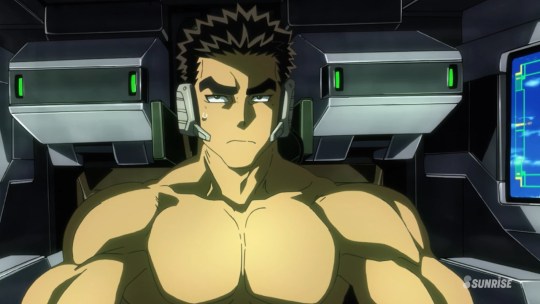
He also gets this delightful little, “I’m allowed to shoot, right?” moment when Carta’s trying to do her speech—which is nice, since it’s typically Mikazuki that gets those moments, and he’s much more certain about it than Akihiro, who asks permission (after the fact, mind).
The battle goes on as all the red flags around Biscuit foreshadowed it would, and we move on, to…
EPISODE 22 — Not Yet Home
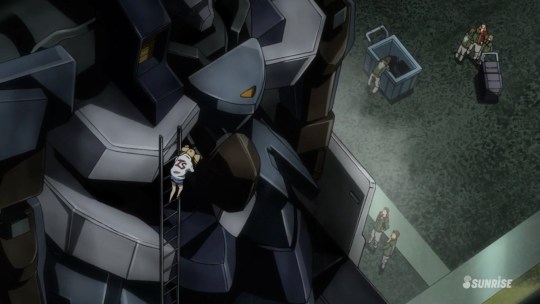
A random red-stripe appears! There’s a Random Brunette—not, I don’t think, meant to be Akihiro—floating around the bay on the transport ship, so I guess there are at least a few around after all.
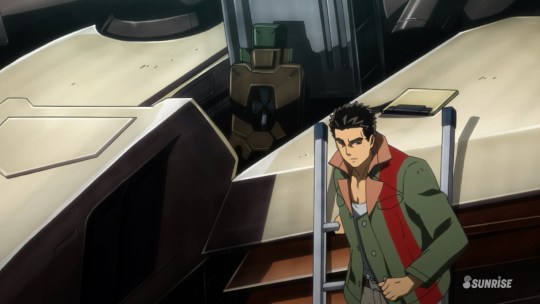
Akihiro himself is here as well, but hanging around Gusion’s cockpit instead.
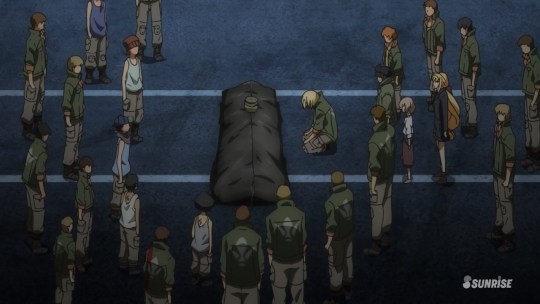
There’s also one standing in the rough circle around where Biscuit has been laid out—which makes sense, as we’ve always gotten the idea that Biscuit is a conscientious, sweet guy to everyone.
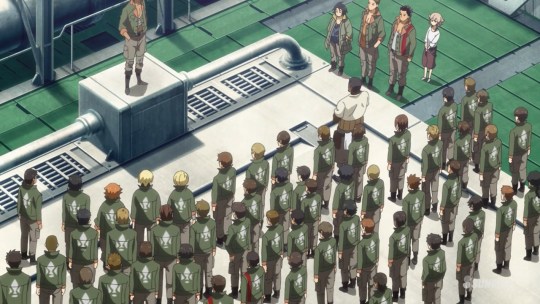
Towards the end of the episode, meanwhile, we see a few in the crowd listening to Orga’s speech to rile up the group after Biscuit’s death.
And that ls likewise it for this one! Man, this write-up’s going way faster.
EPISODE 23 — The Final Lie
Only one observation on Akihiro here: when Carta issues (heh) her challenge to a 3-on-3 fight, Shino is of course all for it, but Akihiro is very ready to throw down as well.
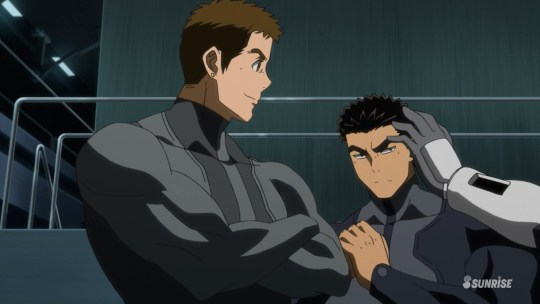
It’s easy to miss because Azee and Lafter break in to remind them (like good mafia members) that they don’t gotta do a deal with nobody, because they have the entire upper hand here. But you can just see Akihiro going to crack his knuckles here.

There’s also three red-stripes in with Yukinojo (rather a first; I assume he’s pulling help from whoever’s available, since he doesn’t have his full usual crew) right as the ending credits start cueing up—one of either side of the screen, and one behind his shoulder. Actually, looking back on it, this might be because they’re dealing more with mobile workers than mobile suits. Mobile suits seems to take a bit of literacy to optimally handle, whereas mobile workers may not, and given the kind of work CGS seemed to do back in the day, I’m sure all the ex-Human Debris are extremely familiar with mobile workers.
And I think Dante and Chad might be back next episode, maybe, so lets move right along.
EPISODE 24 — A Future Reward
We open after a time skip of three days, to find Tekkadan badly hurting but hanging in there. When the mobile suits catch a break, Mikazuki comments about finally being able to eat something, to Shino and Akihiro’s disbelief. I think it’s a little interesting that neither of them, but Akihiro in particular, hasn’t actually learned this tendency, of eating when you can. But then, perhaps Akihiro’s gut instinct is more attuned to only getting food after a successful battle, not right in the middle of one. Certainly food deprivation seems in line with e.g. how the Brewers treated their Human Debris.
There are a number of group shots in Orga’s big speech in this episode, and I do not see a red stripe anywhere among the listeners, not a one. There are likely some members of Tekkadan too injured to stand outside and listen to a lengthy morale-boosting speech, but I think it’s likely that any Human Debris brought to this encounter acted, as they often do, with such willful disregard for their lives that if any of them survived, they’re definitely in that too-banged-up-to-walk category.
Finally, though, in the final push, as the Tekkadan group on the bridge is getting stomped, Eugene shows up with reinforcements, including Chad and Dante—the first time we’ve ever seen either of them actually hand-piloting anything this season, though of course we know from the very first episode (and certainly the Turbines arc) that Dante was capable of it, and could assume Chad was as well.
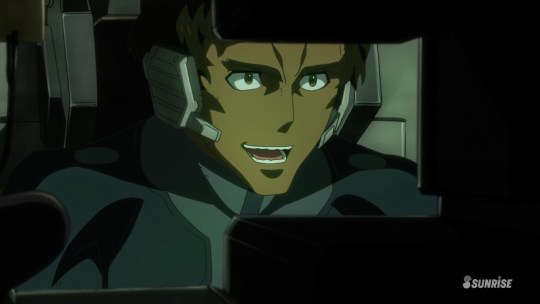
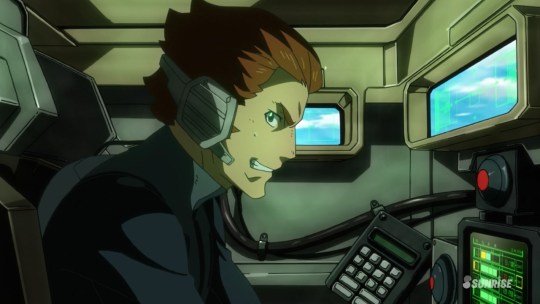
Them, I remembered. You know who I totally didn’t remember showed up here, though?
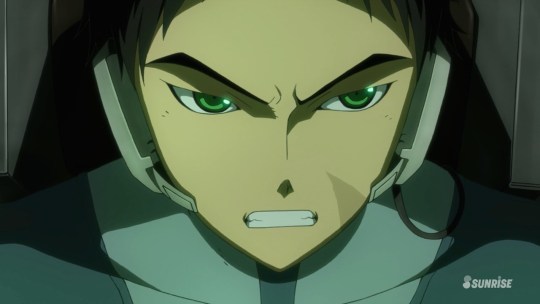
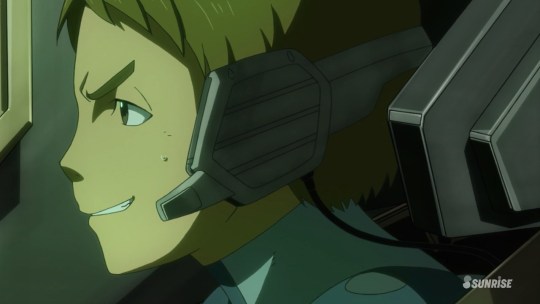
It’s these two! Aston and Derma, the two surviving Brewers kids, here to fight for their place/pay day. Which is interesting in light of their earlier and later characterization—it’s a little reversed, perhaps, than what you might expect. But then, I’ve always been of the opinion that Aston cares far more for his comrades than he was willing to accept he did, and Derma may be fronting somewhat, happy in the moment of playing Big Damn Heroes. And hey, I’m sure the paycheck is an interesting novelty for him. (I don’t buy it as his primary motivator, though.)
Anyway, this reinforcement probably single-handedly saves Ride’s life, and that kid will be pulling like three times his weight next season, so good job, team!
Most of the rest of the episode is, of course, dedicated to Ein being an unholy terror-beast, so lets move on, to the final episode of season one.
EPISODE 25 — Tekkadan
I don’t often include the robot shots, but here, have this one, showcasing the results of Akihiro’s completely off-screen battle with no less than four Grazes, which he fought solo, and, well…
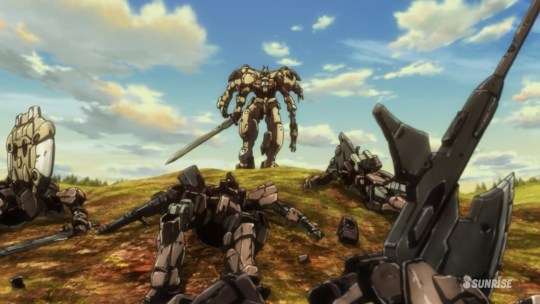
I particularly like that he’s nicked someone else’s sword to hold, and may well have beaten a dude to death with their own arm.

He’s gotten kind of nose-bleedy about it, which could be from an injury, but more likely means he had to wring a bit more than he was used to out of the Gusion himself.
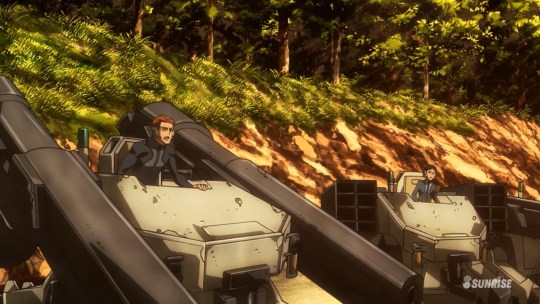
The bridge group’s battle draws to a close with the sighting of a ceasefire signal flare; Chad calls Eugene’s attention to it, and we also get this shot of Dante cracking open his cockpit (very bravely, too). I’m thinking that’s Aston in the background there, a bit too distant to see the scar.

And then we cut to the wrap-up material. Akihiro we find hanging out with Eugene and Shino.

The two are talking about finally going home, and the ones they lost being able to rest in peace, which draws one of these rare non-fighty smiles out of Akihiro.
After some wrap-up with our two main characters and their respective most significant side-character relationships, we come back to the Tekkadan group as a whole for Orga’s series-closing speech. And throughout this, we get both our last shots of our named red-stripes, as well as, for the sharp-eyed, confirmation that some unnamed ones survived as well!
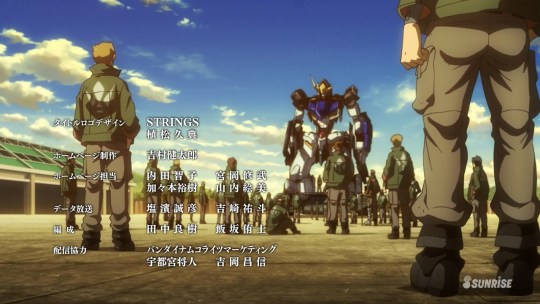
The first one we can see was probably in my hypothesized ‘too injured to walk around’ group, as we can see by the huge full-limb cast on his leg and the cane he’s holding. (Look just to the right of Barbatos, and down, to the left of the blond dude.)

There’re also the two on the right here, looking much more intact. So it seems we have a fair number of red-stripes after all, thankfully. Of course, we never got any distinct recurring character designs for any of them other than our named ones, so by the time next season and the new, unstriped uniforms roll around, we will lose any way to track them. Ah, well. At least Dante and Chad will have more (far more) to do.
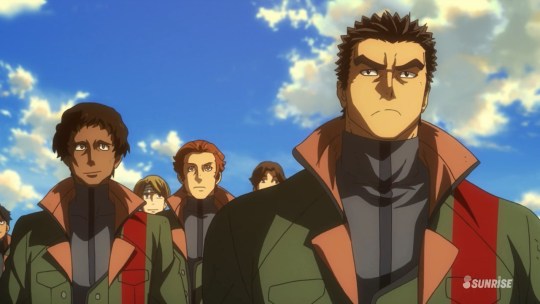
Speaking of, here’s our last shot of our main character red stripes, with Chad looking either slightly off-model or like he’s had a bit of a haircut while he was here. And so serious, Dante! Don’t worry; you’ll get plenty of time to grin (and lots of time to not) soon enough.
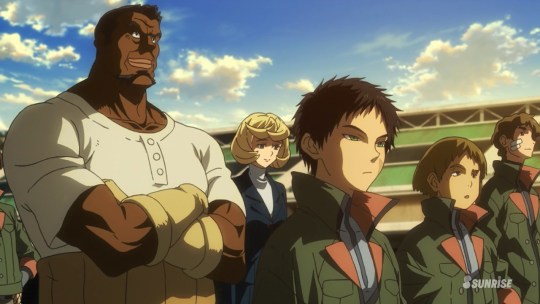
And, as if to foreshadow people who will also be getting more to do next season, we get a shot of Aston and Derma as well. Aston’s solemn about it; Derma looks a bit like this is the first time he’s ever heard such a great inspirational speech.
And at least as far as the Human Debris cast are concerned, that’s a wrap on season one! I hope everyone’s enjoyed this first half of the tour, and will continue on with me into the next season, which offers no shortage of opportunities to point and yell about the red-stripe cast, particularly as they start getting enough attention that those less-eagle-eyed viewers/reviewers are finally forced to start noticing them. Bless.
#mobile suit gundam: iron-blooded orphans#g tekketsu#gundam ibo#human debris#akihiro altland#chad chadan#dante mogro#aston altland#derma altland#human debris project#my writing#ibo meta
13 notes
·
View notes
Text
Watching Over Zion Report 29th November 2018 (21st Kislev 5779)

THE WORD
Arise, shine, for your light has come, and the glory of the Lord rises upon you. See, darkness covers the earth and thick darkness is over the peoples, but the Lord rises upon you and his glory appears over you. Nations will come to your light, and kings to the brightness of your dawn. Lift up your eyes and look about you: All assemble and come to you; your sons come from afar, and your daughters are carried on the hip. (Isaiah 60:1-4)
Command the Israeli’s to bring you clear oil of pressed olives for the light so that the Menorah may be kept burning. In the Tent of Meeting, outside the curtain that is in front of the Testimony, Aaron and his sons are to keep the lamps burning before the LORD from evening till morning. This is to be a lasting ordinance among the Israeli’s for the generations to come. (Exodus 27:20-21)
POINTERS FOR PRAYER
Please use this report for the purpose of prayer. Please intercede over the areas you feel the Spirit lay upon your heart. As Chanukah draws close, let us give thanks to God for the restoration of Israel in our day! 'Hear the word of the LORD, O nations; proclaim it in distant coastlands: "He who scattered Israel will gather them and will watch over his flock like a shepherd." For the LORD will ransom Jacob and redeem them from the hand of those stronger than they. (Jeremiah 31:10-11). As we continue look at the current circumstances within and surrounding Israel, let us remain watchful and constant in our prayers, and continue to pray that the LORD God would place His Wall of Fire around the Nation and people of Israel.
Please continue to pray for encouragement, strength and perseverance for the Israeli people in the face of constant physical and spiritual opposition.Do keep praying regarding the issue of Iran and Gaza. Hamas continue to add to the despair of many in Israel, along with many of their own people in Gaza by their actions and continued violence along the border of Gaza (see last section of this report). Pray that the truth would be reported by the Western Media.
LIGHT OF THE WORLD

The festival of Chanukah is only 4 days away (it falls early in 2018). It begins in the evening of Sunday, 2 December and ends in the evening of Monday, 10 December. As the temperature gets colder and we anticipate the icy mornings and even possible snow, the days are dark and people will try to combat the darkness with lights and candles.
It is said that people living without sunlight become weary and gloomy, even suffering with depression. Human beings need the sun, and to experience sunlight, the human being will maintain a positive healthy life. Many years ago I used to suffer from 'Sad Syndrome' (seasonal affective disorder – a type of depression through lack of sunlight). However, here in the UK our days get 'longer' [albeit very slowly] again in little under a month. That's good news! But spare a thought for those who live in Tromsø (Norway). As this report is being written, the people living in Tromsø only had 28 minutes of daylight. And, the sun set at 11:45 am, and won’t rise until 11:30am on 15th January 2019. That's 48 days without the sun!!
One good thing about this time of the year is that we can celebrate the festival of lights. Both the celebration of the Festival of Lights (Chanukah) and the celebration of the birth of the Messiah Yeshua (Jesus) are times when houses are especially filled with lights. But have you noticed that people put their Christmas decorations up early every year? To me, this speaks of the need to have light and something to look forward to. The people are crying out for something to pull them out of the darkness.
In the Scriptures, the Nation of Israel is often referred to as “a light to the Nations” - In his writings and speeches, David Ben Gurion emphasised his vision of the state of Israel as a moral and social beacon to the whole world, and by that, in his view, it would implement the vision of the prophets. David Ben Gurion said, “History did not spoil us with power, wealth, nor with broad territories or an enormous community lot, however, it did grant us the uncommon intellectual and moral virtue, and thus it [the virtue] is both a privilege and an obligation to be a "Light unto the Nations"”. Even Israel’s emblem is the Menorah which is derived from the image of the state of Israel as a "Light unto the Nations".
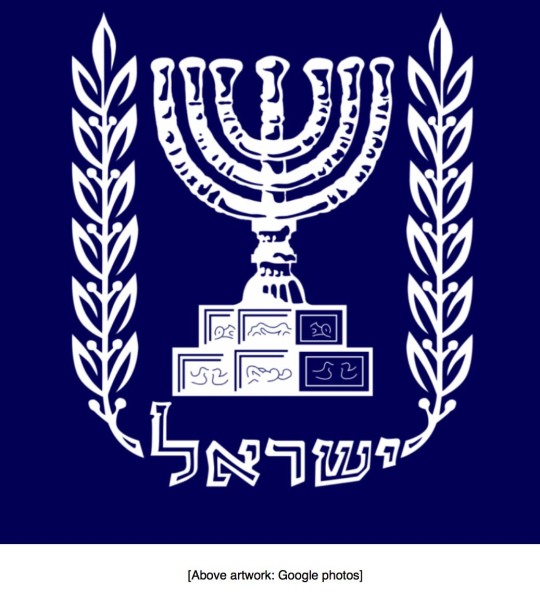
Chanukah is the celebration of the victory of the Word of God over all pagan and anti-Semitic forces – the victory of the sons of Zion against the sons of Greece! It may even have been prophesied in the Scriptures as Zechariah 9:13 reads, "I will rouse your sons, O Zion, against your sons, O Greece, and make you like a warrior's sword." Chanukah starts on the Hebrew calendar date of 25th Kislev, and lasts for eight days. Of course, one of the themes of Chanukah (the Feast of Dedication – see the gospel of John 10: 22vv) is the wonderful miracle of keeping the Menorah Candles burning – to hallow God’s holy Name.
To understand Chanukah, one needs to read Exodus 25:31-40. An order was given for keeping the Menorah (which stood in the Tabernacle and later in Solomon’s Temple in Jerusalem) to constantly burn to represent the light of God. Chanukah’s theme is of course about miracles. The holiday commemorates two major miracles which took place in the time of the Maccabees: the miraculous victory of the tiny Jewish army over the vast Syrian-Greeks, and the miracle of the small vial of oil which burned for eight days when it should have lasted only one day. It was also during Chanukah that Jesus performed many miracles and spoke of these. In John 10:37-38 Jesus states, “If I am not doing deeds that reflect my Father, don’t trust me. But if I do, though you don’t believe in me, believe the works: that you may know, and believe, that the Father is in me, and I in Him.” Yeshua (Jesus) wanted the people of His day to see His miracles and believe in Him as a result. His miracles point to His divine and messianic identity. In this way Yeshua personifies the message of Chanukah: God actively involved in the affairs of his people – surely this must give us hope?
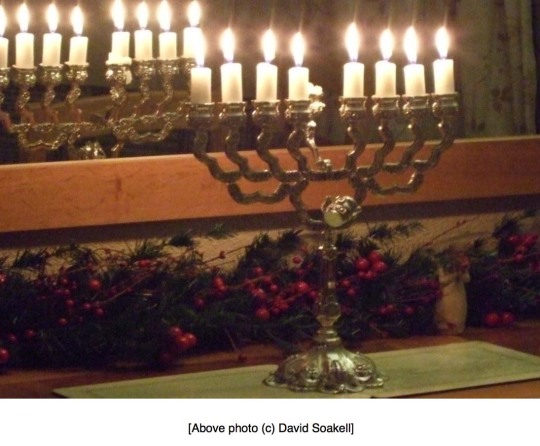
Chanukah reminds us that God is a God of miracles, not just of concept and religious ideals. He has broken through into human history and continues to do so today. Yes, world events do appear to be getting out of control; however there is One, who from the beginning of time has all things under His complete control. This is the Sovereign LORD God, who was, and is, and is to come – the one who ‘in the beginning was the Word, and the Word was with God, and the Word was God. He was with God in the beginning. All things came to be through Him, and without Him nothing made had being… The light shines in the darkness, and the darkness has not suppressed it. (John 1:1-5). Let’s pray that Israel is indeed that light shining in the Middle East and even throughout our troubled world, but that they would also see their Messiah – The Light of the world.
BATTLES IN AND AROUND ISRAEL
Throughout its turbulent ancient history, and indeed most of its modern history, Israel has seen many battles. Today, the battle of survival is as great as it’s ever been, however there is also a great battle going on within.
This week, the Knesset was to vote on Culture Minister Miri Regev's controversial "cultural loyalty law" that would strip state funding from any cultural bodies that work to slander the Jewish state or its institutions. Not all coalition members are enthusiastic about the bill, many calling it a violation of free speech. With just 61 out of 120 Knesset seats on his side, and such challenging votes ahead, Finance Minister Moshe Kahlon doesn't believe Netanyahu's government can survive for very long. "A majority of just 61 seats is a problem," Kahlon said in a radio interview. "It will be very difficult to push through laws. You can't get everyone to agree on every detail of a controversial law."
Then of course, there is the constant battle of ‘survival’. 2018 has seen many battles for Israel to face. The latest round of fighting in Gaza might be over for now (although there has still been rockets fired this week), but it forced Minister Avigdor Lieberman to resign. The Defence Minister resigned over the cabinet's decision to accept a ceasefire ending the current fighting with Hamas and other Islamic Palestinian militants in Gaza. Avigdor Lieberman denounced the move as "surrendering to terror". Benjamin Netanyahu's government survived the resignation of Lieberman and the withdrawal of his Yisrael Beiteinu party from the ruling coalition recently. But now, Netanyahu governs with the slimmest of majorities, and there are some big votes coming up in the Knesset.
Netanyahu defended the government’s decision of a ceasefire last week and stated that he was “acting on information about Israel’s enemies that he cannot share with the public.” Netanyahu went on to say that “Israel would take action to defeat them at a time and in a manner of its choosing.” That was certainly an interesting statement – so what exactly did he mean? Could he have been talking about Iran? After all, the role Iran is playing in Gaza is a very dangerous game. Take for example the Hamas missile strike against a bus recently. The anti-tank missile that hit the bus is chilling. Had it hit the bus full of people, no one inside could have survived. But minutes before the missile struck, the bus was indeed full, with 30 young IDF soldiers. One soldier stated, “We began to sing the Chanukah song that speaks of the miracles that took place as God protected Israel.” Moments after all 50 had exited the bus, a Hamas anti-tank missile hit it, turning it instantly into a ball of fire. Speaking of miracles, the Arab bus driver who had been driving the IDF soldiers stated “God loves Israel. I just let off 50 soldiers from the bus. A minute later the bus was hit. 60 seconds earlier and you would have had 50 dead soldiers.”
However what is troubling is that Hamas terrorists in Gaza filmed the blast. But according to Israel’s Hadashot news network’s Arab affairs commentator, Ehud Ya’ari, the footage of the blast was first broadcast on Iranian television in Lebanon and only later rebroadcast on Palestinian television. Could this be significant? Well, we know that Hamas and Islamic Jihad are not independent actors in their aggression against Israel. Rather, they are Iranian proxies. They receive their orders from Iran’s Revolutionary Guard Corps and Iran’s Lebanese army, Hezbollah. And they report to their Iranian and Lebanese commanders. So when Hamas and Islamic Jihad go to war against Israel from Gaza, the reason is because Iran told them to do so. So when Israel decides not to take the bait but rather accepts a humiliating and – in an election year – politically costly ceasefire, could it be that Israel is waiting for the right moment to take out Hamas’ supplier and controller Iran?
Iran also controls Hezbollah. Iran’s chief area of operations in Israel’s neighborhood is Syria, where Iran has a strong hold. The Russian/ Iranian/ Hezbollah-controlled regime of Syrian President Bashar Assad reasserts and reinforces its control over much of Syrian territory. As it does, the threat of a major war looms that would put Israel against Hezbollah forces in Lebanon, and against Hezbollah, Iranian, and Syrian forces operating under Russian protection in Syria. So in many ways, Hamas in Gaza is only one cog in a very dangerous wheel. One wonders if Netanyahu was hinting that they (Israel) are getting ready to tackle Iran? If so, how do we pray about this?
Despite all this, and even though Israel accepted a ceasefire with Hamas, Israeli Internal Security Minister Gilad Erdan warned that Israel is prepared to recapture and reoccupy the coastal enclave in order to root out Hamas and its terrorist allies should the situation escalate again. Watch his short interview here:
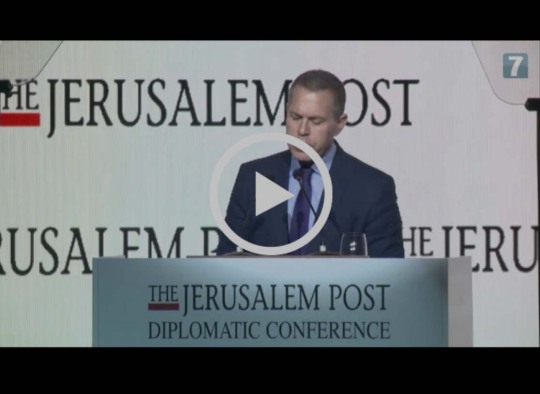
TERRORISM AND FOOTBALL
One of the ways my son and I attempt to ‘de-stress’ ourselves is by watching a game of football. Now of course, as fans of our beloved Norwich City, this can also be distressing too! However at the moment we are rejoicing as we are top of the Championship League Table. Now of course, back in the 70s and 80s, the UK had a lot of football hooligans to contend with which gave the game a bad name. Thankfully, those days are well behind, and generally most fans and opposing fans will walk along to the grounds in harmony. But imagine if instead of ‘Arsenal, Manchester City, Liverpool, Chelsea, Norwich etc. etc., we named our teams after villains, law-breakers or even terrorists? Or what would become if we had our school children playing for tournaments named after terrorists like those who blew up the London underground, or attacked the Manchester arena? Yet this is exactly what is happening in the Arab Palestinian areas – they have football teams named after founders of Hamas, Islamic Jihad, Black September, the PLO terror organization etc., in Fatah football.
In an article by Itamar Marcus and Nan Jacques Zilberdik, they write, “A football tournament for high school boys in Hebron, arranged by the local Fatah branch, named all 11 teams after terrorists - including terror leaders responsible for most of the deaths from terror Israel has suffered since its founding. Six were top Palestinian terror leaders and founders of terror organizations, while the other five were terrorists or members of terror organizations. The PA Ministry of Education endorsed the event's role modeling of terrorists with a representative who ‘honoured the winning players and teams.’”
Some of the team names included ‘The Martyr Yasser Arafat team’ (founder of the PLO and Fatah terror organizations in the 1960s); ‘The Martyr Ahmed Yassin team’ (founder of the Hamas terror organization); ‘The Martyr Fathi Shaqaqi team’ (founder of the Islamic Jihad terror organization) and ‘The Martyr Salah Khalaf team’ (head of the Black September terror organization). A full report can be found via the Palestinian Media Watch report here: https://www.palwatch.org/main.aspx?fi=157&doc_id=26716
POP SINGER PHARELL WILLIAMS ANGERS ANTI-ISRAEL GROUP
Anti-Israel groups say they are furious with Pharrell Williams for performing at this month’s gala in Los Angeles to raise money for the well-being of Israeli Defence Force (IDF) troops, including those injured. Pharrell Williams was among the likes of Ashton Kutcher, Gerard Butler, Andy Garcia, Fran Drescher, Ziggy Marley (son of Bob Marley), David Foster, Katharine McPhee, David Draiman and many more famous names to appear at the Friends Of The Israeli Defence Forces Western Region Gala – which raised over $60million – earlier this month at the landmark Beverly Hilton Hotel.
Pharrell Williams performed his hit song “Happy” after giving a speech, the Hollywood newspaper ‘Variety’ reported, along with NME (New Musical Express). In his speech he also condemned the recent Pittsburgh synagogue massacre. Williams said, “What happened in that synagogue was incredibly cruel, it was wrong, and it’s not supposed to be what our nation is. This group of people have been tested over and over and over again … but you guys show an incredible resilience.” Watch the Pharrell Williams hit song “Happy” in Jerusalem here.

FINALLY THIS WEEK... WHEN IS A PROTEST NOT A PROTEST?
This is a question that HonestReporting have been asking in relation to the violence on the Gaza border. So when is a protest not a protest? What is free speech, really? When the media say "protest", that generally means picket signs and free speech, right? But what if the "protesters" are throwing grenades, launching airborne firebombs and firing high calibre machine guns? What if children are living in fear? Should the media still call it a "protest?" You can watch this short video by HonestReporting and give them your response to their questions. Simply click here.
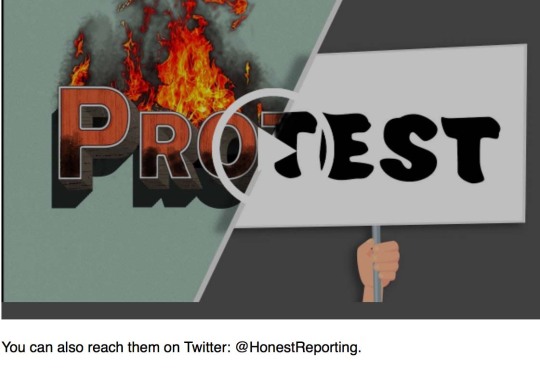
David Soakell
Media Correspondent
Tweet me @David_Soakell

0 notes
Text
The Story of a Dying Man
Download the full story in pdf: https://bitly.com/samisstories1
Part one: An open letter from a dying man
I knew I would pen this letter for as long as I can remember. In my mind, it would have been addressed to my grandchildren or perhaps even my great-grandchildren. Never could I have imagined that it would not only be possible but likely that millions of people will read it. I have truly been blessed for this reason amongst many others. Therefore, I would like to begin by expressing my gratitude to anyone who has taken the time to read about my life.
Our ancestors have lived together in societies for millions of years as humans and hominids before that, which could not have been possible without a great capacity for cooperation and empathy. The ability to understand one another has been built into our minds, long, long ago. But this insight into one another's minds has also allowed us to recognise each other’s weaknesses and vulnerabilities and of course as humans, we have no shortage of these by any means. Undeniably, this has its advantages too. In fact, ignoring the shortcomings of your fellow human beings will inevitably lead to your downfall and quite likely, others around you too. History is full of such examples.
There is a harsh reality that this world does not divide us humans into good and evil, moral and immoral, tyrants and victims, guilty and innocent, oppressed and oppressors, strong and weak; it only sees winners and losers. Only the outcome matters to it. The cruelty is in that these games in which we must come out as winners are not fair. Some are placed in easy games, some face the impossible. Some games are just rigged from the start. Some are zero-sum games but more often there is enough victory prize to go around.
To those who created this world, equality and fairness meant nothing. However, humans have a thirst for justice. That is why we are hurt by injustice. That is why we always find ourselves supporting the underdogs. Therefore, what we should aspire to do is make the games we participate in as fair as can be. But even fair games have winners and losers; that much we must accept. Should we take it upon ourselves to rid the world of this natural order, we will inevitably end up with a corrupt game in which we can lose. And there is no greater catastrophe because the world needs desperately winners. It is they who go on to bring about the change we urgently crave.
But avoid the narcissism that will deceive you into thinking that winning is about how far ahead you are in relation to your fellow human beings. No, true winning is about positively influencing this world. Anything else is merely an illusion of a win.
The contemporary history of this country shows that although it may be true that the default mode of society may be brutal tribal violence, yet we have reached a point in our social evolution where lasting peace is an achievable alternative. It is no longer an unobtainable fantasy confined to our imagination. It does not even require us to suppress our primal tribal tendencies, only to change our perspective so that we can finally appreciate the undeniable truth that in today's world we are part of a single tribe at war with the plagues and famines in this world. Peace is a win for every human alive, even those who actively seek to undermine it.
By no means do I intend to write an auto-biography and bore you with trivial details of my life. Nevertheless, I do wish to give you a brief background to the story I am finally about to get off my chest.
My childhood was a happy one in much simpler times than this. I had loving parents who had moved to this town from a small village near the mountains. Both had only attended school for five years, which was quite common for village folks of their time. Yet, their unconditional support for my education gave me the confidence to invest in my future and become the first person in my family to ever attend a university to study literature. After graduating, I moved back to my town with my newly-wedded wife and built a house for us next to my parents' on the same land that had belonged to our family for generations. This way I could help out my father with his business while focusing on my own writing at the same time.
I guess I was fortunate enough to have found love at such a young age as a student. It is difficult to describe the depth of the bond that forms between two people who vow to not only share the rest of their lives but to a create new life together, too. Such a bond touches every aspect of your life and makes it impossible to imagine the person you would be without having met your better half. Selfishly, I admit that I am glad that it will be I who will be leaving first. She has always been both braver and more resilient. Had I been standing on the other side of this bed, the horror of my impending loss would have been more than what I could cope with. Fate has been more than kind to me to allow me to be surrounded by my wife and daughter at my deathbed.
Oh, my daughter; the joy of my life. She who gives meaning to my existence. I will refrain from mentioning her too much in the hope that she will write her own story one day. She is, without a shadow of a doubt, my greatest gift to this world. After all these years, all I ever see when I look at her is a sweet four-year-old girl. Despite being a grown woman with so many accomplishments of her own, deep in my heart, it is as if she has frozen in time.
Many years ago, an unfortunate event changed the course of my life in a very unexpected manner. In a very bizarre day, I went from being a nobody to negotiating a ceasefire that ultimately ushered an era of peace for the entire country. Much to the frustration of almost everybody else, I decided to refrain from telling my version of the events of that day. Sometimes the truth is simply inconvenient and must be sacrificed for the greater good. There have been many rumours and stories, many very unpleasant to hear. But I always feared that breaking my silence might harm the peace treaty. So many years later, I feel now is the appropriate time to share what happened with you before I take it to my grave. After all, the peace treaty has stood the test of time, despite so many obstacles.
Our town - being so close to the border of the tribal territories - was the first to be invaded by the neighbouring tribe when the central government collapsed. So far away from the capital, we had not been affected by the instability of the central government during the earlier months. So as one could imagine, the invasion came as quite a surprise to us. We received news that the forces of the neighbouring tribe had crossed over the border and were heading our way, so we all locked ourselves away in our houses and the streets were deserted when the forces finally arrived. Our own tribal troops had already been dispatched by then but were still a couple of hours away. Transport can be difficult in this mountainous terrain.
I brought my parents to my house and along with my wife and young daughter, hid in one of the bedrooms. The invading forces had been entering each house and firing on sight. That much I could tell from the screams. Our horror was beyond imagination as they drew closer to us, house by house. After what had felt like aeons to me, the soldiers kicked down our door and came in. My father and I leapt out of the room to stop them from coming in. Three soldiers and another man who appeared to be their superior. Later on, I would find out that he was the man in charge of the whole invasion.
They lined us up against a wall, even my young daughter who was silently watching us in horror. No talking, crying or screaming. Suddenly one of the soldiers asked for permission to shoot when I begged for ten seconds before the commanding officer could reply. He just stared at me without saying anything back or giving permission to the solider. I introduced myself and my family to him but felt that he was growing impatient. I told him that I was a writer and have stories that are almost ready for publication. It seemed that when I would stop talking, he would have given the order to shoot, so I carried on. I asked if he would like to hear one of my stories and began telling it without waiting for him to answer.
I had told my stories to many people before that day, but nothing could have prepared me for that situation. Even I was impressed by my own storytelling as I was kneeling against the officer, face to face with death. The soldiers were ready to slaughter us all and were visibly angry at their superior for not allowing them to. But I had his full attention throughout the story. When I finished, he did not react in any way at all. But the subtlest change in his countenance gave away his admiration for the story. I told him I have more stories to tell if he spares my family. He ordered the soldiers to take me alive and let my family be. No sentence had ever made so happy in my life. All I cared about was my daughter; that she would live. I would have taken a round of bullets for her. I would have been willing to sacrifice my parents and wife too if it came down to it. Such an experience changes the way you think about everything, permanently.
When we left the house, I was thrown into the back of a pickup truck and had to sit next to five soldiers. The officer took the passenger seat of the truck. It seemed like he had given the order for the soldiers to regroup outside of my house. I always wonder whether he had planned to stop at that point all along or whether it was I who led him to halt the bloodshed. When they assembled on the street, I saw that there were no more than fifty of them in total; only fifty. There were enough arms in the town to have enabled us to defend ourselves before the troops even arrived. The massacre could have been avoided entirely. It was our own cowardice that allowed it to take place.
In five trucks, around thirty of the soldiers and I headed out of the town towards the mountains for some reason I could not understand. The remaining soldiers were left behind. The truck I was in was travelling in front of the others. There was a mist around the area that day, which had limited our vision to twenty metres at most.
Suddenly, around a sharp bend at the base of one of the peaks, we came face to face with our own tribal troops who were finally making their way towards our town. There were almost twenty seconds of a standoff between the two groups of soldiers. My heart was pounding; another bloodshed was imminent. I jumped out of the truck and ran up the road until I was midway between the two groups. "Don't shoot!" I shouted at the top of my voice.
As fate would have it, the leader of our troops recognised me, instantly. Our fathers were best friends since their childhood and so had we. I hadn't seen him for years, so it took me a bit longer to recognise my old friend. He told his men not to shoot. I will never know why the leader of the neighbouring tribe forces didn't shoot me right there, but they held fire. I called out the two leaders and begged them to come and meet where I was standing to negotiate a way out of this without further bloodshed. I don’t know how many minutes it took them to put down their guns and approach me, but to me, it felt like an eternity. I guess all that matters, in the end, is that they did. My memory does not serve me so well to provide you with a transcript of that conversation, but the outcome was simple. The forces would be allowed to return to their own territory unharmed if they agreed to an indefinite ceasefire. After contacting their respective headquarters, they agreed. A ceasefire was agreed on the spot and I played a major role in negotiating it. The soldiers of each tribe relocated along the border just after, but there were no more incidents.
I was hailed a hero when the news of what had happened broke out in my town. A permanent ceasefire was negotiated during the next days and I was invited to attend the meeting between the leaders of the tribes. Of course, our work did not end there and the three other tribes - who were also fighting each other at that point - were involved until a final deal was reached between all five tribes to stop the violence and set up a coalition government to replace the collapsed central government. I had been involved in every step and was appointed as a senior advisor to the leader of the coalition. The personal benefits of everything that happened did not matter to me one bit; all I cared about was that I had played a part to bring peace to my country and more importantly, my daughter had survived.
One day, a few years later, I was awakened to find scores of people from the town who had gathered just outside my house to acknowledge my efforts for putting an end to the war and to thank me for them. I must admit, I can scarcely think of a more emotional day in my life. I was awarded different prizes over the years that followed from all over the country and even abroad, but I never left this town because I felt they needed me the most.
There was an undeniable element of good fortune in the events of that period but that was not the whole story. It was a moment of mercy that initiated the whole process; a simple connection between a predator and his prey. Then, it was a fight between the respect that each side had for one another fighting the hatred they had. I cannot even imagine the horrors that would have taken place had the hatred become victorious. Neither my family or I would have been around to witness it.
It seemed my stories - which never actually got published, in the end - had a hidden purpose all along. I am proud of the work that my colleagues and I have put in over the years not only to establish peace but to maintain it, too. But personal recognition had never been my goal. This was one of the reasons that I had withheld my account to this very day. I resigned from the government to stay politically impartial and focus on the humanitarian side of my work. My childhood friend was promoted after the signing of the peace treaty and served as the leader of our tribe and then, the country as you may already be aware. We have held weekly meetings to discuss current affairs ever since.
I would like to end my letter by reminding you of a truth; there will be moments in your life when you have the potential to do good to an extent beyond imagination. Take every opportunity to relieve the world of its suffering.
Always remember how different this story could have ended.
Part two: The speech at the funeral
Ladies and gentlemen, thank you for joining us in our mourning, today. I will have the honour of giving this speech and for good reason too, for I knew our departed friend almost as well as anyone ever did. It is my opinion that even if the whole world had turned up for this ceremony today, he still would have deserved a bigger crowd, simply because… Well, you will understand why by the time I finish my speech.
The nature of this world is such that the pain and horrors we are able to inflict on others are far greater than our ability to do good for one another. It is much easier to hurt someone than to help them and the effects often last longer as well. To make things worse, what we gain by hurting others is almost always much smaller in value than what we have taken away from them. Every time we cross a fellow human being, we inflict a subtle loss on society. Of course, we also live in that same society, so we’re ultimately incurring a loss as well. Also, acts of cruelty are seldom isolated because our craving for justice can easily be manipulated into a need for revenge. Without any warning signs, a society can fall victim to the domino effect of hateful actions.
Every day of our lives, we are competing for resources against other people. If you end up winning a competition, be magnanimous. Understand that your victory may have just as likely to stem from your advantageous circumstances as from your abilities. Remember that your value as a winner only depends on how you use the resources you have won to serve those who finished behind you in the race. Imagine life as a race for which you are running on a track. Your objectives are two-fold in this race; do your best to win it and inspire those behind you. There is no value in finishing the race miles ahead of everyone else when the others might not even be able to reach the finish line. That is not a world worth living in. The real prize isn’t in winning itself; never forget that.
The day the tribal war broke out, his life changed forever. For him, there was no going back. Only in death will he escape the scars that remained from the war. But I don’t wish to reduce this man to only a victim of the tragedies of war. I will begin this story at a much earlier time before we ever came face to face with the devastation of war.
Our fathers were very close friends who were also distant relatives. Regardless of the story that blood tells you, they were brothers at heart. They grew up together in a small village and had been friends their entire lives. Though moving to two different towns had separated them when they got married, they would see each other quite often by visiting each other’s towns, back in the old days. Both of us being their only sons, we also joined them on those days hopes of spending another day with each other. I had no siblings or even any cousins that lived remotely close to me, so since our fathers were brothers at heart, to us, this made us cousins. And that was the story everybody would hear when we visited each other. We would say to our friends, ‘oh look, my cousin has come to spend the day with me again.’ Those morning when I either waited for them to arrive or when I had to sit through the journey to reach them were quite possibly the most exciting parts of my childhood.
As we grew older, the stark differences in our interests and talents became more and more apparent. But we embraced it with our childlike naivety. How brilliant it was of us to not view them as obstacles to our friendship, but rather think that we complemented each other as friends. He had a natural gift for humanities and sports, I was more of an odd mixture of a fighter and geek. Imagine a footballer who wrote poems and fictional stories between the two halves of a match and the science geek who practised boxing during his breaks. We were similar in that we were both very odd people, not fitting into any stereotype. I guess, that made our bond stronger.
High school must have been when we became the closest. Neither of our towns had high-schools during those days, so we both attended one, which was in a third town halfway between the two. For the first time, we would spend time with each other almost every day. We made quite a team and by constantly challenging each other, it became a time of rapid development for us. But good times never last forever and soon, high-school was over. I remember the day we were awaiting the results of the university entrance exam together. The good news was we both got what we wanted; I was granted admission at a medical school in the northern region of the country and he was accepted into a very prestigious university to study literature just off the southern border. I wanted to be a doctor and he wanted to become an author. Well, the bad news, as you may have already guessed, was that we would be on the opposite sides of the country. We parted ways that day at the peak of our friendship, not knowing the dire circumstances under which we would meet each other, next.
He had married a girl he had met at university. I was unable to attend the wedding being caught up in medical school, but my father told me it was a beautiful celebration of love. Once they graduated, they moved back to his town, where he built them a house on his father’s land. See, he had no siblings either and thought that he could help out his old man and work on his own writings on the side. His father had kept the business running for so many years, but it was the help of his son that allowed him to carry it on until the very end. And he did not see this as a burden either, rather a debt he was slowly repaying to his parents for all their kindness.
I missed the birth of his daughter too. I only heard about it months later, while I was buried under books with my final exams approaching. It would be wrong to say I was envious; no, it was not envy, but that from what I was hearing he was having the perfect life while I was struggling my way through every hour of every day. No, it was not envy, because he was never my rival, but at that point, he had become my idol. This promising young author had already started his own family and lived next to his parents to help them out with their affairs, while I was many hours away from my family whom I rarely ever visited and not longer than a day whenever I did, was years away of even considering starting my own family and had sacrificed every last bit of happiness to my career. In a way, I wanted to become him and the happier he would be, the higher I’d aim, so every piece of good news my father ever told me of him made me smile.
When the government collapsed, still being amongst intellectual circles, I quickly realised the true danger of what would lay ahead. I knew that a civil war between the tribes was imminent. It had happened so many times in history and now, there was the perfect opportunity for the warmongers on every side to attack one another again. Now, I was in the business of healing not harming, but I’m also a pragmatic person and so, my profession didn’t stop me from travelling back home and joining the tribal troops to defend our people. My conscience was clear and deep down I knew this was the right thing to do.
When I returned, simply because of my education and partly due to my reputation as a fighter from the old days, I was asked to lead unit of troops. On my second day, we heard the news that a massacre in one of our towns had begun by opposing forces from the neighbouring tribe crossing the borders. We left only half-prepared with about 80 soldiers, short on weapons and only ten overcrowded trucks. I was sitting in the leading truck when suddenly at a sharp end of a road leading into one of the valleys on the way, we came face to face with a small number of enemy trucks. The road had a slope that we were on the higher side of and I suppose it was that that really gave us the upper hand. We were ready to shoot on sight and they weren’t expecting us, so before they could fire a bullet in the right direction, they were either dead or speeding back down the same road they came from. Knowing what they had just done, we never intended to let a single one of them live, so we didn’t rest until every last one of them was dead. We then got out to inspect the dead and were quite surprised to find someone tied up in the back of one of the trucks completely unharmed by our bullets. But surprised changed to shock when I recognised my childhood friend again after all these years.
I noticed the odd behaviour straight away, even though I couldn’t quite figure it out yet. He shook my hand and thanked me for ‘giving peace a chance.’ His behaviour and words perplexed me. Then, he pointed to the corpse of one of their soldiers who we later found out was in charge of the invasion and massacre and told me ‘this gentleman kindly put a stop to the bloodshed after listening to one of my stories. They were almost about to kill us before I started talking. Thank God you two were able to call a truce and my family are safe again at home.’
‘It didn’t click at first. For a brief moment, I even thought he was trying to be funny about it, maybe some odd humour he had learnt at university; I really didn’t know. I hadn’t much time to pay attention to it, either. We proceeded to his town and hunted every remaining soldier until they were either dead or had retreated to their own territories. The civil war lasted only hours in the end, but many civilians had died in this town. When I dropped him off at his home, which was built on the land he and I used to play as children, he insisted that I come inside to meet his wife and daughter. But what I saw next still haunts me to this very day. We entered the house to find the dead bodies of his wife, daughter and parents, all lying next to each other covered with tens of bullet holes each. Forgive me for crying, I will never be able to think of that moment and not die a bit more inside.
The next thing he said made finally sense to me, despite it being totally insane. He called them forward one by one, introducing them to me as if they were still alive as if nothing had happened. He’s in shock, I realised! I was speechless. I just wanted to scream ‘They’re dead!’, but just didn’t have the courage to do so. I played along. He went and kissed the pale but bloodied face of his innocent and beautiful daughter and told him to meet her uncle that he had told her so much about.
I asked my next in line to take over my duties that day. I couldn’t leave my friend alone. Asked him whether he wanted to come to the morgue with us, but he replied that although he will pay his respects to the victims in due time, he wanted to spend today with his family. Next, he would sit on the floor and look in random directions and have conversations with whomever he thought he was speaking to.
After a whole day had passed, I had to take the bodies to the morgue, but he had yet to acknowledge their passing yet. He didn’t even react when he saw my men moving out the bodies. ‘Hurry up please! You’ve scared my daughter, so she’s locked herself in her room until you go.’ That was the only thing he said to them.
Their bodies were held at the morgue for months. Eventually, when he repeatedly refused to come to the morgue with me, I buried them along with a few remaining distant family members. I begged him to join us, but my words never registered in his brain. I took several doctors whom I had befriended to treat his condition, but none were successful. He talked to us as if we had come to ask him for help to put an end to the other conflicts in the country. Soon it was made clear to me that he somehow saw himself responsible for restoring peace in our region. I could not bring myself to challenge that. What cruel man would take that away from someone who has nothing else in this world but this delusion?
Soon I gave up hope of making him leave the house. I would bring him enough food to last him a week every Friday. I did this for all these years after the massacre without missing a single week. But he never thanked me, never acknowledged that I was taking him food, but instead, every single time, he greeted me with the same sentence, ‘I see you’ve come to discuss matters of great importance with me again, General.’ I heard this line from him hundreds of times, if not thousands, and not once did it change a bit, even in tone.
One day, a few years after the massacre, people of the town stormed his land and tried to take it by force because they didn’t that believe he was still living there. When they entered his house by the tens, they were all shocked, and may I say even humiliated, to find him sitting in the corner, looking at empty space and pretending to help his daughter with her maths homework. Almost every person who was there went and hugged him and told him how sorry they were for what had happened. I received the news and hurried over but arrived only as they were leaving. When we were finally alone, he said to me, ‘Wasn’t it wonderful they all came to thank me for stopping the war? It’s so heart-warming to hear about the difference I’ve made.’
No, I confess that I never tried to rid him of his delusion. It was the one thing he had left, and I would have fought to protect it until my last breath. Last week, I was shocked when I discovered him dead at his desk. As a doctor, I paid very close attention to his health and he was not suffering from any disease. In fact, if you assumed his fantasies were indeed true, even his mental state was fine. He was not depressed or manic. He wasn’t violent or angry. He wasn’t angry, but I was. My idol’s life had turned into my worst nightmare. There was not a life I could have imagined deeper submerged in suffering than his. The events that turned his life from total happiness to the depths of despair took only a few seconds. Just a few seconds of madness from a cruel cold-hearted man with a gun in his hand, completely overlooking the humanity of his victims. A single wrong decision by one man condemns another to a lifetime of misery.
I would like to end my speech by reminding you of a truth; there will be moments in your life when you will have the potential to cause destruction and suffering to an extent beyond imagination. Resist the temptation to add to the world’s suffering.
Always remember how different this story could have ended.
0 notes